Paris peace accords brings spring of freedom to nation: former Deputy PM
ABO/NDO- The signing of the Paris Agreement on Ending the War and Restoring Peace in Vietnam on January 27, 1973, had brought a special spring to the northern region, when for the first time in the resistance war there was no air-raid siren and no evacuation, former Deputy Prime Minister Vu Khoan told Vietnam News Agency during a recent interview on the occasion of the agreement's 50th signing anniversary.
Khoan, who is also former Secretary of the Party Central Committee, recalled the circumstances around the negotiations for the agreement, which could be said to be the longest peace talks in history. The process lasted from 1968 to 1973 with more than 200 public sessions, 45 high-level private meetings, and thousands of interviews and rallies.
On January 23, 1973, the Paris Agreement on ending the war and restoring peace in Vietnam was initialed by two special advisers Le Duc Tho and Henry Kissinger. On January 27, 1973, the Foreign Ministers of the four parties, including the US, the Democratic Republic of Vietnam, the Provisional Revolutionary Government of the Republic of South Vietnam and the Republic of Vietnam, officially signed the Paris Agreement.
 |
| Former Deputy Prime Minister Vu Khoan. (Photo: chinhphu.vn). |
According to Khoan, a major advantage for Vietnam in the negotiation process was the national solidarity power and support of people worldwide, including the Americans. However, the difficulties facing the country were the huge losses in its struggle against a powerful country like the US, and the disagreement among fraternal socialist countries.
According to him, the negotiation on the Paris agreement left many lessons for Vietnamese diplomacy. Though not directly engaging in the treaty talks, he personally drew four lessons, including gathering and combining the national strength with epochal and international power, consistently maintaining one's stance, staying persevere and being wise.
Asked about the role of culture in diplomacy, Khoan said Gen. Vo Nguyen Giap had told visiting US Secretary of Defence McNamara that Vietnam’s victory is attributable to culture, not military power. Vietnam’s national power was underpinned by patriotism and solidarity spirit. Moreover, the Vietnamese people are ready to set aside the past and look toward the future.
In Khoan's view, every Vietnamese should be an ambassador conveying the quintessence of the national and diplomatic culture when meeting with foreign friends.
He said he still remembered the festive atmosphere in the Lunar New Year’s festival following the signing of the treaty. The international community, leaders of countries and overseas Vietnamese all shared the joy with Vietnam.
(Source: NDO)
 về đầu trang
về đầu trang







